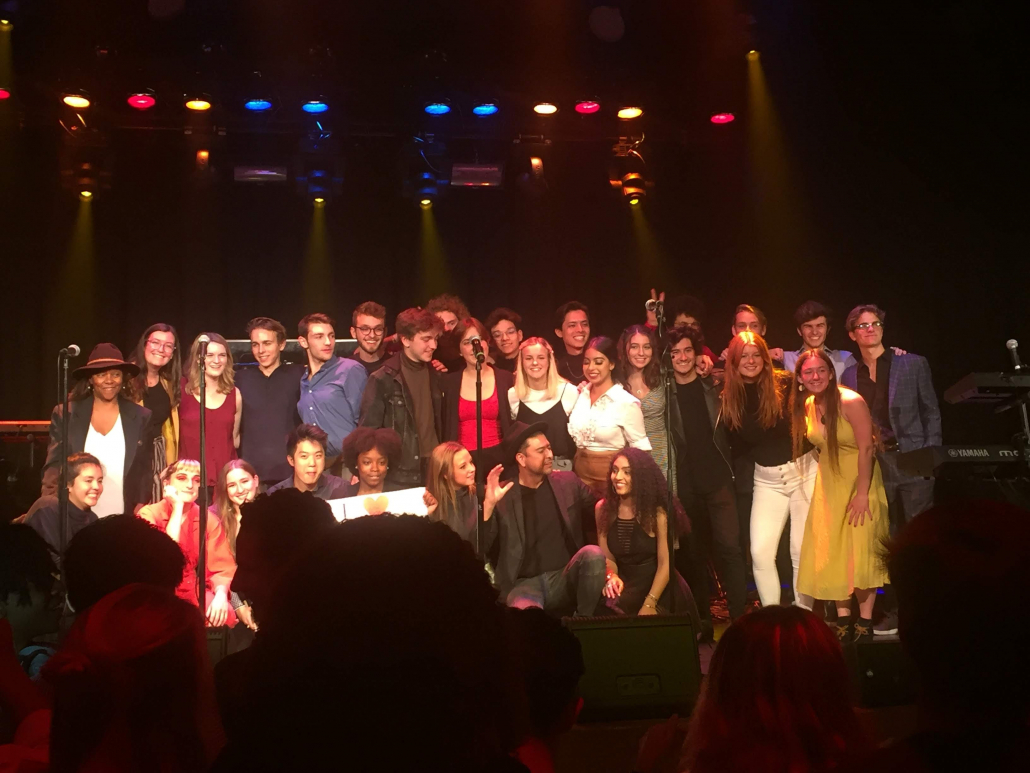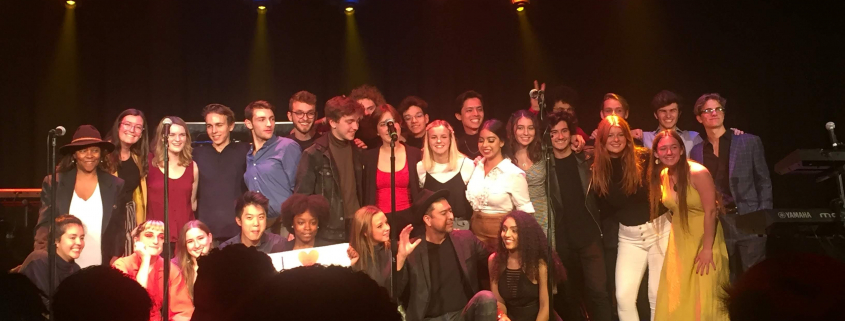Pop Music students maintain collaborative creative efforts

This week marks the first year since the coronavirus pandemic turned USC’s student body on its head. For popular music majors — a group of students whose curriculum relies heavily on in-person experiences — at the Thornton School of Music, this change forced them to become innovative in the ways they create community.
A year later, from new performance methods and programs to foster connections, the limitations of a virtual environment have not stopped students from doing what they do best: making music.
Usually, first year showcases are performed at Tommy’s Place, but because of the coronavirus pandemic and performance classes being placed on hold for Fall 2020, the first virtual showcase was hosted Mar. 5 and garnered around 140 attendees. The event, carried out by the freshmen pop class, was open to the entire student body, past alumni, professors, faculty, staff and parents.
The event featured four bands of students who learned a repertoire list of two to three songs — note for note — with various instruments over the beginning of the semester before recording their respective performances on Acapella, a sound engineering and songwriting app.
Sophie Feldman, a junior majoring in popular music and psychology who attended the showcase, said she applauded the students’ performance and their adaptation to the virtual stage.
“I really admire the freshman’s patience and commitment to really selling it because I watched their performance and they killed it; they were so engaging — they definitely made the best of a really unfortunate situation,” Feldman said.
Freshman Maddi Lasker, who participated in the showcase, said she was quite impressed with the level of warmth, friendliness and initiative the upperclassmen took in welcoming the newcomers.
“Online, it’s very easy for things to be awkward or you can be hesitant to other people, but [the upperclassmen] were so outgoing, so friendly and overall just so excited to get to know us,” Lasker said.
Thornton’s Popular Music Performance program has always been a tight knit community, according to sophomore Maria McMillan, owing to its small size of around 25-30 people per cohort.
As a small community, popular music students rely on one another not just for academics and performances but for social support and advice, junior Dominic Anzalone said. The major organizes each class into bands with different mixes of students and instruments — a difficult thing to do without in-person classes and with in-person performances postponed.
McMillan said that she appreciated the guidance of upperclassmen popular music majors when she first entered the program as a freshman.
“You go from being one of the best on your instrument in your small hometown … to being surrounded by people who are all on your level, and it’s a really hard adjustment to make,” McMillan said. “I know for me it was really important to have juniors and seniors and even sophomores — just people who had been through exactly what I was going through to be able to talk to about it.”
Despite the setback of the coronavirus pandemic, McMillan and Anzalone still hosted a virtual pop party to welcome the virtual class.
“There were a lot more [attendees] than I expected and lots of the freshmen came,” McMillan said. “We haven’t really had the chance to do [anything] online because of [coronavirus] so this was the first formal, informal gathering, organized by students from pop.”
Following the event’s success, the popular music cohorts continued the momentum of building bridges between members by starting a Big Brother, Big Sister program for freshmen to connect with upperclassmen.
Organized by students like Feldman over winter break, the mentorship program was designed to break the ice between older students and freshmen who would have to work together for the next few years.
“Collectively as a class, we had talked about how bad we felt for the freshmen that they weren’t going to experience the physical pop family the way that we had,” Feldman said. “We didn’t want them to feel like they missed out on getting to know us because we also didn’t want to miss out on getting to know them.”
The program matched upperclassmen with freshmen depending on things they had in common, including their musical instrument specialization, similar personality traits or their particular hometown. Around 20 pairs are currently formed, Feldman said.
“I think it’s gone really well,” Feldman said. “Everybody who I have talked to that has gotten in touch with their pop big or little is really glad to have a new person in their life because it’s hard to find new people in your life right now.”
Anzalone, one of the upperclassmen who participated in the program as a mentor, said he wanted to help new students fit into the Trojan Family.
“I think [these kinds of events] are necessary, generally because I’m very family-oriented and community-oriented,” Anzalone said. “[Thornton takes] the family-oriented thing seriously, and it’s easy to feel alone … I think having all of us to be able to support each other and be there for one another really means a lot.”
For Feldman, while nothing can replace the communal feelings of physical rehearsals and showcases, virtual classes have also provided some unique opportunities.
“I was basically forced to gain a sense of independence with recording my own voice and recording my own guitar playing,” Feldman said. “It’s also been great because logistically … I can have a session with somebody, no matter where they geographically are, as long as we know exactly what time to be there.”
According to Laskar, the small group of freshmen continue to grow closer while still separated from one another in person.
“I think it would have been very easy for us to not really be close with each other,” Lasker said “I actually feel like being online and all, undergoing these challenges and still having to overcome those has actually made us closer.”
Although pop music students have faced the challenge of remote collaboration, Feldman said that the online programming demonstrates the innovative ways students can work together and point to the even stronger work they can produce when they are in person again.
“I can’t wait to see the freshmen in person and see them play a showcase in real life,” Feldman said. “Because if they can handle performing the way that they’ve handled Zoom, I can’t even imagine what they’re going to be like in person.”

